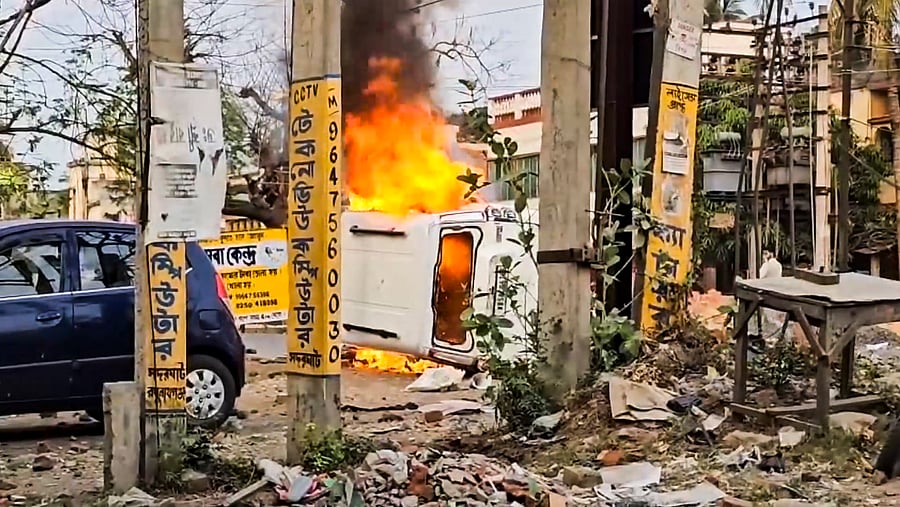
Flames billow out after a vehicle was set on fire during a protest over the Waqf (Amendment) Act, in Murshidabad district of West Bengal, Tuesday, April 8, 2025.
Credit: PTI Photo
Haragobinda Das and his son Chandan Das made clay idols of deities to eke out a living. Their home at Jafrabad in the Samsher Ganj block of Murshidabad came under attack on April 11, when the protest against the
new Waqf (Amendment) Act, 2025, turned violent in West Bengal. The miscreants dragged the father-son duo and hacked them to death before looting the family’s valuables.
“We called the local police station, but no one responded. My husband and father-in-law lay dead for four or five hours,” Chandan’s wife, Pinki, said. The police, however, arrested two men, Kalu Nadab and Dildar Nadab, on April 15 in connection with the murder of the father-son duo.
Hours before Haragobinda and Chandan were killed, Izaz Ahmed was returning home at Kashim Nagar on a rickshaw when the mobs protesting against the new law turned violent at Sajur More in nearby Suti, leading to a clash with police. Izaz was hit by a bullet.
He lay injured on the road for a while before police took him to a hospital in Jangipur. The bullet was extracted, but he needed blood. “Police didn’t help. We hired a vehicle and took him to another hospital in Baharampur for a blood transfusion. But we couldn’t save him,” Izaz’s mother, Sayema Bibi, said, with her slain son’s daughter, Arohi Khatun, sleeping on her lap.
Murshidabad has started limping back to normalcy after days of communal clashes triggered by the violent protests against the new Waqf (Amendment) Act, 2025. The shops, except the ones gutted in arson, are reopening, and the vehicles are back on the roads. The displaced people are returning to their plundered or charred homes, with many of them blaming the police and the administration for failing not only in pre-empting the violence but also in dealing with the unrest quickly and protecting them.
With the next Assembly elections in West Bengal just about a year away, the Bharatiya Janata Party, which had emerged as the principal opposition party in the state in 2021, wasted no time to cash in on the communal violence in the state and sharpened its attack against the ruling Trinamool Congress, harping on its accusation that Chief Minister Mamata Banerjee’s government was pursuing “a policy of appeasement”. The party alleged that the TMC government had not acted fast to stop the “atrocities on Hindus” in Murshidabad just to protect its “vote bank” among the Muslims.
The saffron party won 18 of the 42 Lok Sabha seats from West Bengal with a 40.7 per ecnt vote share in 2019, as against just two seats and a 17 per cent vote share in 2014. The BJP’s seats in the 294-member West Bengal assembly went up from just three in 2016 to 77 in 2021, with the vote share rising from 10.16 per cent to 38.14 per cent.
The TMC won 215 seats in the state Assembly in 2021 – three more than its score in 2016 – with a 48.02 per cent vote share.
The BJP’s score in the 2024 Lok Sabha elections went down to 12 seats with 38.73 per cent vote share, while the TMC won 29 seats with 45.76 per cent votes. This prompted Suvendu Adhikari, the state BJP heavyweight and the Leader of the Opposition in the state Assembly, to argue that the party should aggressively focus on promoting Hindutva to win the 2026 assembly polls in the state. “Jo hamare saath, hum unke saath (We are with those who are with us). Stop saying sabka saath, sabka vikas (We are with all to ensure the welfare of all),” he said in July 2024. He continued making such statements over the past few months and even went on to say recently, “Only Hindus will rule in Hindustan.”
The TMC, on the other hand, accused the BJP of bringing in “outsiders” to trigger violence and disturb the communal harmony in the state to polarise the electorate for its vested political interests. The party also alleged the BJP-led government at the Centre of using the Border Security Force, a central paramilitary force, to destabilise the state. Mamata Banerjee already said that the new Waqf (Amendment) Act, 2025, would not be implemented in the state. Her party had opposed the passage of the Bill in the Lok Sabha and the Rajya Sabha, and she urged all other parties of the I.N.D.I.A bloc to continue opposing the new law unitedly.
Banerjee also has her plans ready to blunt the BJP’s Hindutva campaign. On Monday, she visited and worshipped at a temple of Goddess Kali at Kalighat in Kolkata and inaugurated a skywalk built to make it easier for the devotees to reach the shrine. She herself will lead the inauguration of a grandiose temple of Lord Jagannatha at Digha, a seaside town in the Purba Medinipur district, the home turf of BJP’s Suvendu Adhikari. The TMC hopes that the grand inauguration of the temple will blunt not only the BJP’s aggressive Hindutva campaign in West Bengal but also its allegations about appeasement of Muslims by Banerjee.
The Communist Party of India (Marxist), however, alleged that the TMC government had deliberately allowed the protest against the new law to turn violent, as it wanted to deflect public attention from the recent verdict of the Supreme Court, which upheld the Calcutta High Court’s April 22, 2024, order invalidating the appointment of the 25,752 government school employees, who had been recruited by the state’s School Services Commission (SSC) in 2016.
